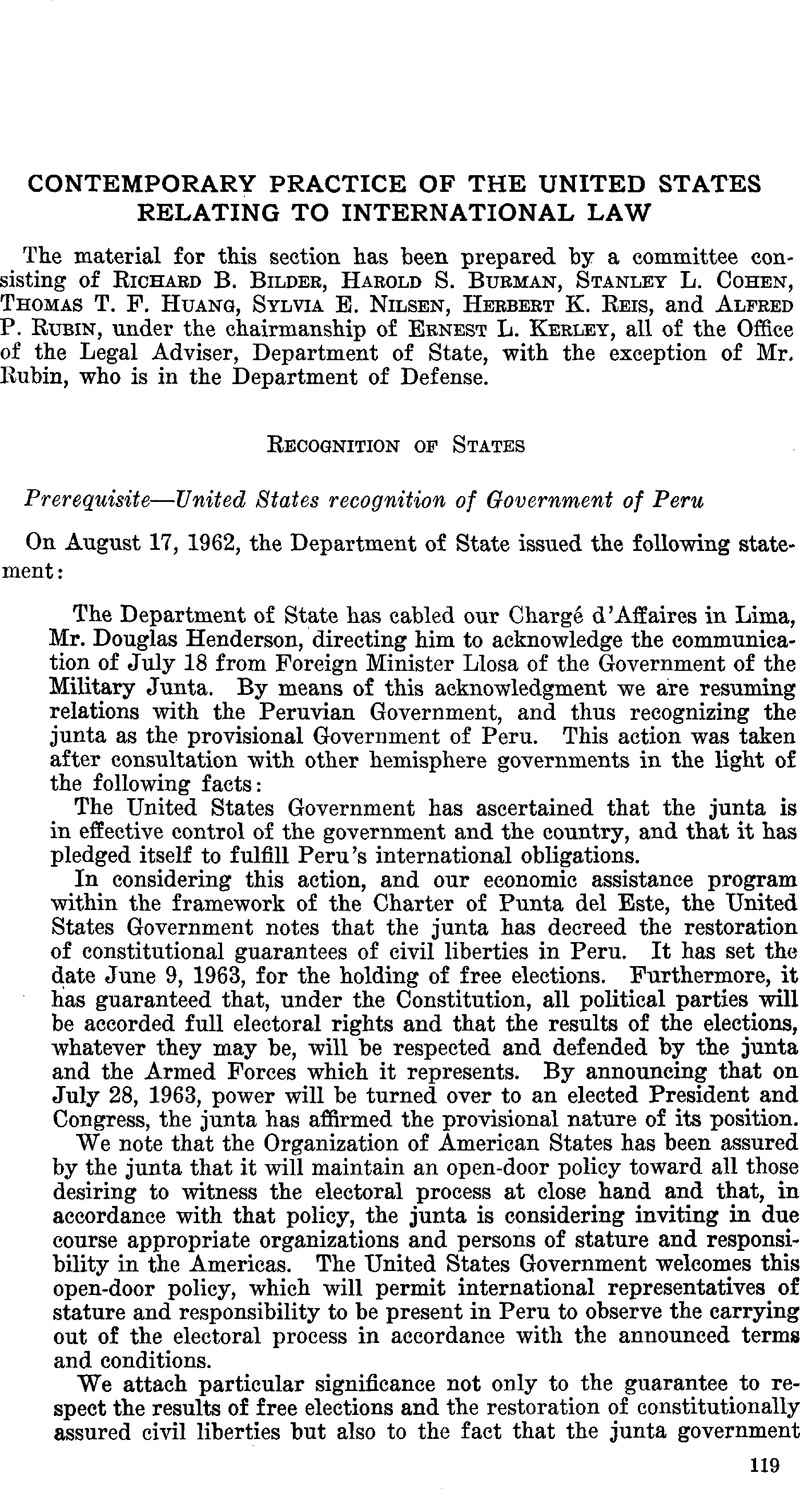No CrossRef data available.
Article contents
Contemporary Practice of the United States Relating to International Law
Published online by Cambridge University Press: 28 March 2017
Abstract

- Type
- Other
- Information
- Copyright
- Copyright © American Society of International Law 1963
References
1 Article 7 of the Convention on Eights and Duties of States, signed at Montevideo on December 26, 1933, ratified by the United States on July 13, 1934 (49 Stat. 3097, 3100), provides as follows: “The recognition of a state may be express or tacit. The latter results from any act which implies the intention of recognizing the new state.”
2 Hackworth,, I Digest of International Law (1940), p. 356; see also other examples cited by Hackworth, supra, pp. 356–358.Google Scholar
3 Burnet v. Chicago Portrait Co., 285 U. S. 1, at 5–6 (1932).
1 U.N. Docs. A/CONF.13/L.52-57 (1958); 52 A.J.I.L. 830 (1958).
2 The function of the Secretary General, in respect of all conventions concluded under the auspices of the United Nations and of which he is the depositary, is as follows:
3 Article 21: “ The Government of the Czechoslovak Eepublic holds that under international law in force all government ships without distinction enjoy immunity and therefore does not agree with the application of articles 19 and 20 of the Convention to government ships operated for commercial purposes.” U.N. Doc. ST/LEG/3, Eev. 1 at 6 (1961).
4 All reservations were substantively equivalent to the reservation of the Union of Soviet Socialist Eepublic: Article 20: “ The Government of the Union of Soviet Socialist Eepublics considers that government ships in foreign territorial waters have immunity and that the measures mentioned in this article may therefore be applied to them only with the consent of the flag State.” Ibid, at 8.
5 Article 21: “ The Government of the Hungarian People's Eepublic is of the opinion that the rules contained in Sub-Section B of Section III of Part I of the Convention are generally inapplicable to government ships operated for commercial or non-commercial purposes, in foreign territorial waters. Consequently, the provisions of Sub-Section B restricting the immunities of government ships operated for commercial purposes are applicable only upon consent of the State whose flag the ship flies.” Ibid, at 7.
6 With the following reservation: the Government of the Tunisian Eepublic does not consider itself bound by the provisions of article 16, paragraph 4 of this Convention.Ibid.
7 “ I n signing the present Convention, the Eepublic of Venezuela declares with reference to article 12 that there are special circumstances to be taken into consideration in the following areas: The Gulf of Paria and zones adjacent thereto; the area between the coast of Venezuela and the island of Aruba; and the Gulf of Venezuela.“Eeservation made upon ratification: ” . . . with express reservation in respect of article 12 and paragraphs 2 and 3 of article 24 of the said Convention.” Ibid.
8 All reservations and declarations were substantively equivalent to those of the Union of Soviet Socialist Republics:
9 “ Articles 2, 3 and 4. The Iranian Government maintains the objection on the ground of excess of competence, expressed by its delegation at the twelfth plenary meeting of the Conference on the Law of the Sea on 24 April 1958, to the articles recommended by the Fifth Committee of the Conference and incorporated in the afore-mentioned articles of the Convention on the High Seas.” The Iranian Government accordingly reserves all rights regarding the contents of these articles in so far as they relate to countries having no sea coast. “Article 2(3)–article 26, paragraphs 1 and 2. Application of the provisions of these articles relating to the laying of submarine cables and pipelines shall be subject to the authorization of the coastal State, in so far as the continental shelf is concerned.” Ihid. at 14; 52 A.J.I.L. 851 (1958).
10 Reservation made upon ratification: “ . . . that the terms territorial sea and internal waters mentioned in the Convention, as far as the Republic of Indonesia is concerned, are interpreted in accordance with Article 1 of the Government Regulation in Lieu of an Act No.” 4 of the Year 1960 (State Gazette 1960, No. 22) concerning Indonesian Waters, which, in accordance with Article 1 of the Act No. 1 of the Year 1961 (State Gazette 1961, No. 3) concerning the Enactment of All Emergency Acts and All Government Regulations in Lieu of an Act which were promulgated before January 1, 1961, has become Law, which Article word by word is as follows:
11 “ Article 4: With respect to the phrase the Coastal State may not impede the laying or maintenance of submarine cables or pipe-lines on the continental shelf, the Iranian Government reserves its right to allow or not to allow the laying or maintenance of submarine cables or pipe-lines on its continental shelf.” Ibid, at 24; 52 A.J.I.L. 862 (1958).
12 “ In signing the Convention on the Continental Shelf of 29 April 1958, the Federal Eepublic of Germany declares with reference to article 5, paragraph 1 of the Convention on the Continental Shelf that in the opinion of the Federal Government article 5, paragraph 1 guarantees the exercise of fishing rights (Fischerei) in the waters above the continental shelf in the manner hitherto generally in practice.” U.N. Doc. ST/LEG/3, Rev. 1 at 24 (1961).




